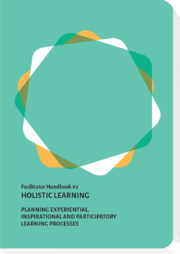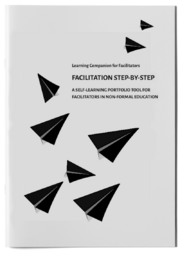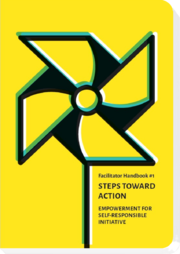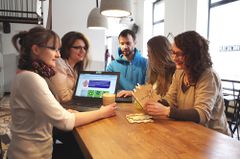The handbooks for facilitators, trainers, animators or other educators will be published as PDFs, ebooks and hard copies. They will be completed by additional working material and the content of the virtual toolbox. Grounding on our experience this attunement between print product and online source allows us to use the strengths of each media best. Print supports understanding of content more holistic and to develop a more precise story. The virtual toolbox allows more interconnection of content, more completing methods, involvement of third people`s experience, tips and links in an ongoing way.
#2 Holistic Learning
Planning experiential, inspirational and participatory learning processes.
Competencies are shaped best through processes that include a broad range of learning opportunities, such as incorporating knowledge, learning by doing, reflecting on specific actions, and cooperative learning. This allows for a conversation between self-driven activities and methods of facilitation that include participants and groups and all their diverse needs, experiences, and expertise.
In the series we introduce with this book a planning approach and the building blocks for such a holistic learning experience, and explore how “facilitation” adopts a different attitude from a classical model of teaching.
|

MitOst Editions 2016
Handbooks for Facilitators #2
ISBN 978-3-944012-30-8 (Print)
Release: November 2016
|
From the Table of Content:
- Holistic learning - a holistic definition
- The facilitator's attitude
- Planning
- The building blocks of a holistic approach
- Outlook: Moving toward holistic learning in our practice
|
Editors: Elke Heublein (Working Between Cultures), Nils-Eyk Zimmermann (MitOst)
Design: Slav Georgiev (Ideas Factory)
Facilitation Step-by-step
Learning companion for facilitators.
A self-learning portfolio tool for facilitators in non-formal education
|

MitOst Editions 2017
ISBN 978-3-944012-32-2 (PDF)
Release: January 2017
|
Content:
- Checklists and tools for self-learning
- Attitude and learning goals
- Target group and institution
- The concrete training
- Evaluation and perspectives
|
Editor: Nils-Eyk Zimmermann (MitOst)
#1 Steps toward action
Empowerment for self-responsible initiative. Help your learners to discover their vision and to turn it into concrete civic engagement.
The starting point of any civic involvement is motivation and inspiration. Therefore the first chapters cope with how to support learners to identify their inner motivation for initiating social change and self-development. The instructor, trainer or teacher has a crucial role in this regard. Therefore we introduce the idea of facilitation - a supportive, inspiring and trusting in the capacities of the learners.
|

MitOst Editions 2016
Handbooks for Facilitators #1
ISBN 978-3-944012-27-8
Release: September 2016
|
From the Table of Content:
- Equipping individuals with Competences for Action
- Inspiring civic engagement
- Why do people get involved?
- Motivation
- Realism and lasting motivation
- Teams and support
- Outlook: From inspiration to action
- Glossary
|
Editors: Marta Anna Gawinek (SKORO), Eliza Skowron (Working Between Cultures), Nils-Eyk Zimmermann (MitOst)
Design: Slav Georgiev (Ideas Factory)
Roadmap:
2017
|
- European, global and international dimension of learning
- Stimulating creativity, using art, culture and holistic expression in empowerment processes
|
More:
Inspiring handbooks and toolboxes from all over the world.
Apps and online tools supporting facilitation and teamwork across places and borders.
Books & Online Sources
Contact

editors@competendo.net
Support

This toolbox has been produced with the financial assistance of the European Union. The contents of this document are the sole responsibility of the implementing partner organisations and can under no circumstances be regarded as reflecting the position of the European Union.

























